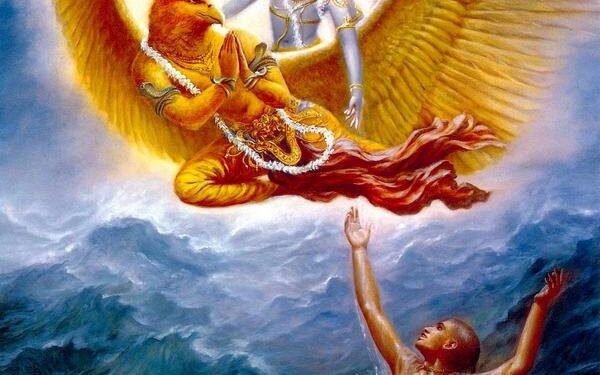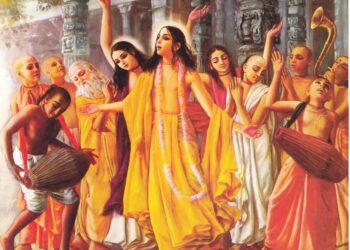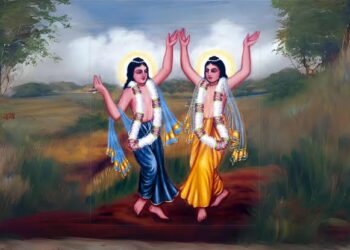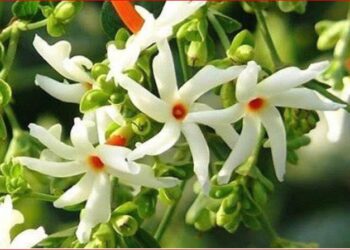1.110.9. Friendship with a king is an impossibility; a serpent devoid of poison is unheard of; a household cannot remain pure if too many women flock there together.
1.110.10. A devoted servant should be engaged in household duties; a son should be engaged in study; an enemy should be employed in acts of vice and a friend in virtuous acts.
1.110.11. Servants and ornaments should be put in proper places; a crest-jewel worn on the foot will never shine.
1.110.12. Crest-jewel, ocean, fire, bell, the vast expanse of the firmament and king – these have to be at the head; it is wrong to keep them at the foot.
1.110.13. A man of stuff will have access to one of the two goals like a bunch of flowers. Either he is at the head of everyone or he fades in a forest.
1.110.14. If a fine jewel worthy of being set in a fine earring is worn on the foot it will not take away the brilliance. It is only the wearer who will be criticised by others.
1.110.15. Great is the difference between any two members of each of these: horses, elephants, iron, wood, stone, cloth, women, men and water.
1.110.16. It is impossible to deprive a courageous man of his good qualities though he may be tortured and tormented. Even if it is suppressed by a rogue the flame of a fire does not shoot downwards.
1.110.17. A horse of good breed does not brook a cut from the wip; a lion cannot bear to hear the trumpeting sound of an elephant. A true hero does not coolly listen to the loud boasts of his enemy.
1.110.18. None shall deign to serve the wicked or the base even if unfortunately deprived of wealth of fallen from a high position. Even though oppressed by hunger the lion does not stoop to graze the grass. It is satisfied only when it drinks the hot blood of elephants.
1.110.19. He who tries to cultivate again the friendship of one who has once deceived him really seeks his own death like the she-mule that conceives.
1.110.20. The children of an enemy shall never be neglected or treated with indifference by sane men in spite of the fact that they may be speaking sweet words. After the lapse of some time they may be very dangerous and terrible like vessels of poison.
1.110.21. If a thorn pricks the foot, another thorn is held in the hand with which the former one is removed. Similarly, an enemy should be wiped off by another enemy whose help for the nonce can be secured by an act of gratification.
1.110.22. None need worry about a man who constantly harasses him. Such people will fall off themselves like the trees on the banks of rivers.
1.110.23. When fate is adverse, disastrous harmful things may seem to be auspicious and vice versa. This attitude shall eventually bring destruction, too.
1.110.24. If the fate is favourable, naturally, good fruitful thoughts beffiting the matter on hand occur to everyone everywhere.
1.110.25. Unnecessary bashfulness and reserve need not be felt in monetary transactions, acquisition of knowledge, taking food and dealings (with the wife in the bed chamber).
1.110.26. None shall stay in a place where these five do not live: rich men, Vedic scholar, king, river and a physician.
1.110.27. Even a day’s stay shall be avoided in places where means of livelihood, fear of law, sense of shame, courteousness and liberal-mindedness are not available.
1.110.28. One shall not think of staying permanently in a place where these five are not available: an astrologer, a Vedic scholar, a king, a river and a saint.
1.110.29. O Saunaka, knowledge is not the monopoly of anyone. All do not know everything; there is no omniscient being anywhere.
1.110.30. In this world we cannot find an omniscient man nor a person utterly foolish. A man can be considered base, middling, or highly intelligent in accordance with the type of knowledge he possesses.
Suta said:
1.111.1. I should now mention the characteristic features of the king as well as the servants. A king should examine the following carefully.
1.111.2. He should protect the kingdom with devotion to truth and virtue. He should righteously rule over the earth after conquering the enemy.
1.111.3. A florist collects flower after flower but does not uproot the plant. The king should also do likewise but not like the maker of charcoal who burns the entire tree in the forest.
1.111.4. Those who milk the cow and drink milk do not do so if it is turned sour. So also the king should not defile the kingdom of the enemy which is expected to be enjoyed.
1.111.5. The man who wants cow’s milk does not cut off its udder. He draws the milk no doubt. Similarly, the king who wants to tap the resources of a kingdom shall avoid injury to the same.
1.111.6. Hence, the king should rule over the earth with care and exertion. In that case the earth, the fame, longevity, renown and strength shall all be truly his.
1.111.7. The king of well controlled sense organs will be able to protect the subjects only if his rule is righteous and if he worships Lord Vishnu and is eager to render service to cows and brahmanas.
1.111.8. After acquiring prosperity which is not permanent it is essential that a king should turn his attention to virtue. All riches will perish in a moment but not the wealth of the soul.
1.111.9. Indeed, it is pleasing to gratify the lust. It is true that riches are highly pleasant. But life is as fickle as the roving glances of a winsome maiden.
1.111.10. Threatening us like the tigress, old age is waiting for an attack on us. Diseases like enemies crop up all over the body. Life flows out like water from a broken pot. Still no one in the world does ever think of a redeeming the soul.
1.111.11. O men! Do service unto others. Do what will be beneficent later on. Why do you rejoice now, without any suspicion whatsoever, along with the bevy of beautiful damsels, smitten by the arrows of Cupid, with your eyes very slow (to see what is in store for you)? Do not commit sins. Taking brahmanas and Lord Vishnu as your refuge begin worship. Your life is slowly coming to an end like water in a pot. In the guise of death a great spirit will pounce upon you.
1.111.12. He is a wise man who regards another man’s wife as his mother, another man’s wealth as a lump of clay and all living beings like himself.
1.111.13. It is for this that brahmanas wish their kings to be rich, that in all their rites their words should be heeded and never slighted.
1.111.14. It is for this that kings board wealth that after serving themselves they shall give unto the brahmanas what is left over.
1.111.15. The king in whose realm the sound of Om uttered by the brahmanas is resonant, flourishes. Getting whatever he wants he is never tormented by sickness.
1.111.16. Even the apparently incompetent sages can gather the riches and articles of daily use. Then why cannot a king who protects his subjects like his children?
1.111.17. He who has riches has many friends. He who has riches has many kins. People consider him who has riches fit to be called a man and a scholar.
1.111.18. Friends, sons, wives and relatives abandon a man devoid of wealth. When he regains his lost wealth hey come back to him. Hence, wealth alone is a man’s kith and kin and none other.
1.111.19. The king who has discarded the sacred code is no better than a blind man. A blind man may well see through spies but not so a man devoid of sacred codes.
1.111.20. The kingdom of that king is indeed unstable whose sons, servants, ministers, priests and sense organs are not active and alert but always asleep.
1.111.21. He who has acquired the valuable support of the three sons, servants and kins has actually conquered the earth girdled by the four oceans along with the kings.
1.111.22. The king who transgresses the injunctions of scriptures and the dictates of reason perishes here in this world and forfeits the right to heaven.
1.111.23. A king surrounded by calamities should not lose heart. He should maintain equanimity both in happiness and sorrow and should never lose enlightened delight of the soul.
1.111.24. Courageous souls never become grief-stricken when mishaps occur. Does not the moon rise again though gobbled up by Rahu?



















